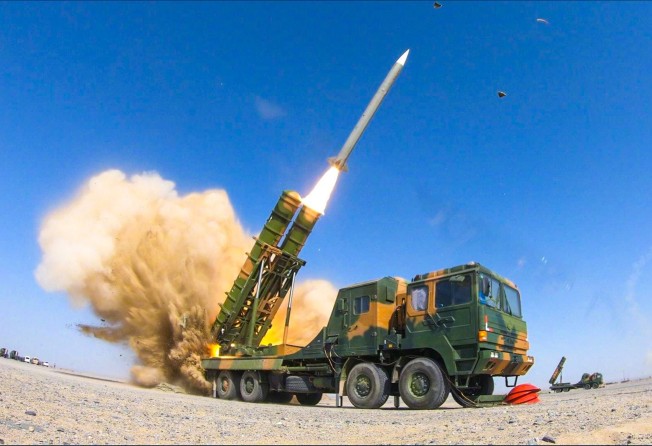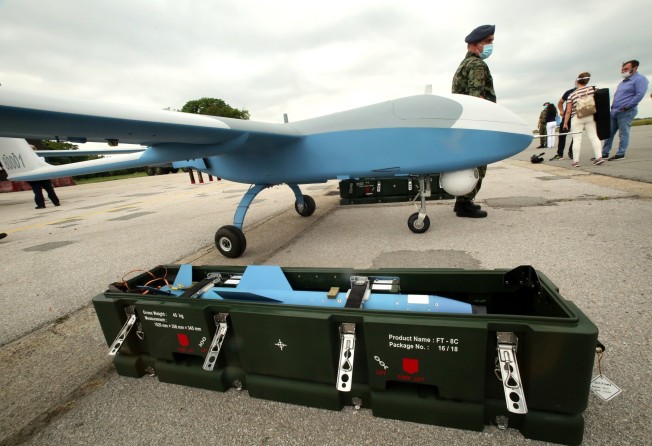
European concerns over Serbia’s ties to China resurface after reports of missile delivery
- Reports that China delivered weapons to the Balkan state were criticised by its neighbours as a threat to their own security
- Montenegro says Belgrade was buying weapons from ‘an open enemy of Europe’ and analysts say there are concerns the missiles might be delivered to Russia

The controversy over Serbia’s deal to buy Chinese missiles reflects concerns about China’s military power projection as well as local tensions, according to analysts.
Recent reports that FK-3 surface-to-air missiles had been transported to Serbia by Chinese jets were criticised by its neighbours Montenegro, which voted to end its union with Serbia in 2006, and Kosovo, which broke away from Serbia after a bloody conflict in the late 1990s.
The leaders of both countries expressed concern that the missiles could endanger their own security, and Montenegrin President Milo Djukanovic also warned that Serbia was buying weapons from countries that “appeared to be open enemies of Europe and Nato”.
Serbian President Aleksandar Vucic defended the missile deal, signed in 2019 along with an agreement to buy Chinese armed drones, as “legitimate, completely regular and transparent” and said the weapons would be used to defend the country against “cruise missiles and planes that would violate the airspace of Serbia”.
The following year Belgrade officially inducted six Chinese CH-92A attack and reconnaissance drones, making it the first European country to deploy Chinese unmanned aerial vehicles.
Although Serbia has appldied to join the European Union, its closeness to Russia and China have caused concern across the continent, and the ongoing tensions from the break-up of Yugoslavia continue to cast a shadow over the Balkans.
Germany said last week it expected Serbia to conform with EU foreign and security policy if it wishe to become a member of the bloc.
Taylor Fravel, director of the Security Studies Programme at the Massachusetts Institute of Technology in the United States, said the delivery had attracted attention because of the recent Russian invasion of Ukraine.

“[The Russian-Ukraine conflict] has raised questions about possible Chinese military responses to the conflict and whether the missile systems being delivered to Serbia might ultimately be provided to Russia,” said Fravel.
Timothy Heath, a senior security analyst from the US think tank Rand Corporation, said: “Serbia’s decision carries important political significance, as it seems to show Belgrade views its relationship with Russia and China as of high importance, perhaps as important as its relationship with the EU.
“The purchase likely reflected both long-standing good relations between China and Serbia and perhaps signalled Serbia’s desire to strengthen its relationship with wealthy patron China.”
Besides the Russia-Ukraine conflict, Fravel said the recent arrival of Chinese Y-20 transport planes in Serbia – widely believed to be carrying the missiles – was “noticeable”.
“It was the first time that a large-number of China’s new military transport, the Y-20, conducted an operation in a region far from China,” he said.
Chinese media reported the use of the planes, which have a range of 4,500km (2,800 miles), was a show of the country’s strategic capabilities.
But a source close to the Chinese military said the planes were used because Serbia was landlocked.
“Normally, when China delivers military weapons to buyers, Beijing would opt to deliver by sea. Or, if the country shares a border with China, like Pakistan, Beijing could also use trucks,” the source said.
“But Serbia is an inland country. All ports the country has good connections to are in foreign countries, such as Montenegro and Romania, making it not the best choice to deliver military weapons.”

China has been exporting missile systems since the 1960s. According to data from the Stockholm International Peace Research Institute, China has sold missile systems to nearly 50 countries.
“Chinese missiles are widely regarded as of high quality … The only competitor for arms sales would have been Russia, and the attractiveness of Russia has been in decline as its economy stagnated,” Heath said.